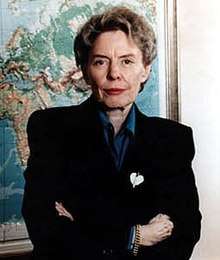Smith College commencement controversies
Commencement controversy at Smith College in Northampton, Massachusetts has sometimes been the result of the selection of the commencement speaker. Most recently, this occurred between February and May 2014, when protests over Christine Lagarde’s invitation allegedly forced her to rescind her acceptance to give the commencement speech for the class of 2014 at their graduation. While it is said that “such reversals have become more common in recent years” given that, “what has changed is not so much the protests themselves, but the willingness of colleges and speakers to give in”,[1] there is actually a longer history of controversy over the chosen commencement speaker that spans back to the 1960s if not before. What Smith’s history shows is that the struggle over representation, as demonstrated by the controversy over commencement speakers in many colleges, is not a new occurrence, but rather an old stage for a struggle over an institution’s values and those that the institution represents.
1967, Nicholas Katzenbach
In 1967, the then-President Thomas C. Mendenhall invited Nicholas Katzenbach to be the commencement speaker for the graduating class. At the time, he was the 24th Undersecretary of State under Lyndon Johnson. When it was announced that he was to give the commencement speech, he was roundly criticized for his stance on the Vietnam War. The senior class petitioned, stating: “We are honored by the presence of Nicholas B. Katzenbach as our commencement speaker. We respect and admire his past work in the fields of civil rights and crime prevention. However, in his post as Under Secretary of State, he is clearly a representative of America’s present foreign policy. Therefore, we the undersigned graduating seniors of Smith College take this opportunity to express our opposition to our government’s responsibility for widening the conflict in Vietnam.”[2] At their own commencement, members of the graduating class wore white armbands to express their disagreement with the foreign policy of the United States.
Many faculty members also made their opposition to the Vietnam War clear by providing every commencement pamphlet with a petition. The petition quotes: “Our hopes are that the U.S. Government, by means of an extraordinary conciliatory gesture, will seek a way of bringing peace to our country and to the world.”[2] Nicholas Katzenbach delivered the speech on the 4th of June, 1967, titled, “How Can You Be So Sure?”[3] amidst all parents, faculty, staff and students. After his speech, President Mendenhall held a conference where Katzenbach expressed the policies of the U.S. in regards to the Vietnam War more specifically. The Alumnae Quarterly of the Summer of 1967 reflected on both methods of protest as “dignified” and hailed the president for handling the situation so well.[3]
1970, Dr. Alan F. Guttmacher
While there was not as much controversy in 1970 over the choice of Alan Frank Guttmacher, the president of Planned Parenthood, the backlash from parents and Alumnae represent their powerful force in an institution that no longer represents them directly. 1970 was also the year that President Richard Nixon's daughter graduated from Smith College. He could not attend the event because his policies were not widely accepted and to avoid the possibility of protests at what was a considered a non-political event. Many parents and Alumnae wrote to the president, Thomas Mendenhall, declaring their dissatisfaction with the commencement speaker choice and lamenting how the President of The United States, nor his daughter, could be present at her own graduation. In a letter to the editor of the Daily Hampshire Gazette, the author stated: “If the present Administration and Trustees feel [they] cannot handle the troublemakers on Campus, then quietly resign and I’m sure you will have some others who will be quite capable of handling the situations as they arise and will not cop-out.”[4] Many were upset that the president of Planned Parenthood, an organization that they say promoted pre-marital sex, could speak in front of the Smith Community while the President of The United States “could not” attend.
Dr. Alan F. Guttmacher delivered his address on graduation day, which was titled, “Fertility Control: A Gift and Challenge.”[5]
1983, Jeane Kirkpatrick

One of the most notable controversies of Smith College’s history of commencement was the President’s, Jill Ker Conway, and the trustees’ decision to host Jeane Kirkpatrick as the class of 1983′s speaker. After she served as a foreign policy adviser to Ronald Reagan, she was the first female U.S. ambassador to the United Nations and was known for her doctrine, The Kirkpatrick Doctrine which justified U.S. support of military dictatorships in Central and South America. Almost immediately after the announcement of their choice, students organized against it, claiming that a human rights abuser should not receive an honorary degree. A letter to the Alumnae Quarterly by Helen Haddad ’63 said: “Students began writing letters and ‘perspectives’ pieces to The Sophian, both in support of, and in opposition to, Mrs. Kirkpatrick–among them was a piece written by a senior whose aunt was one of the four Maryknoll nuns killed in El Salvador. They discussed their interpretations of Mrs. Kirkpatrick’s published books and articles. They discussed American foreign policy in Latin America, South Africa, and elsewhere. Some students who in October knew very little about Mrs. Kirkpatrick, except perhaps that she was an ambassador to the United Nations, were now arguing over her views and votes, whether or not she was an appropriate commencement speaker and whether or not they approved of the award of an honorary degree”[6]
Besides the tone which assumes Smith Students did not know of these issues before Kirkpatrick was chosen, it is clear that there was much sentiment against what made her a powerful woman within the U.S. government. This incited a discussion on the kind of feminism that Smith represents, being an all women’s liberal arts college. When Kirkpatrick canceled her commencement speech and eventually declined the honorary degree, alumnae, students, parents, and the media took hold of the story and framed it as a freedom of speech issue that was plaguing College Campuses.
2014, Christine Lagarde
.jpg)
The frame that many media outlets used to situate the Kirkpatrick controversy at Smith was used again in 2014 in regards to Christine Lagarde’s decision to withdraw her acceptance to speak at graduation. Christine Lagarde, the first female Managing Director of the International Monetary Fund, sparked numerous protests, petitions, and discussions. Parallels were drawn with Smith’s current campaign, that states its mission as educating powerful woman for the benefit of the world.[7] Whether or not Christine Lagarde benefited the world with her high-status position was the contested question.
In the wake of the protests, she rescinded her acceptance to speak at Smith College’s commencement ceremony. The response to her withdrawal was immense. Numerous articles appeared in major media outlets. Many alumnae wrote to the President, Kathleen McCartney, and faculty petitioned against those who had petitioned in support of McCartney and the Trustees. Students who had organized against the choice of having her speak wrote an open letter to McCartney after she emailed the entire College, stating: “I want to underscore this fact: An invitation to speak at a commencement is not an endorsement of all views or policies of an individual or the institution she or he leads. Such a test would preclude virtually anyone in public office or position of influence. Moreover, such a test would seem anathema to our core values of free thought and diversity of opinion. I remain committed to leading a college where differing views can be heard and debated with respect.”[8]
See also
- "After Protests, I.M.F Chief Withdraws as Smith College's Commencement Speaker", New York Times
- "The Commencement Controversy", New York Times
- "Everything is political these days. Even commencement Speeches" Washington Post
- "Pomp and Protest: 11 controversial college commencement speakers", Today News
References
- "After Protests, I.M.F. Chief Withdraws as Smith College's Commencement Speaker". New York Times. Retrieved 1 April 2015.
- "Class of 1967 Records, RG 80, Box 2238, Commencement Folder". Smith College Archives. Retrieved 1 April 2015.
- "How Can You Be So Sure?". Smith College Alumnae Association. Retrieved 26 May 2016.
- "Smith College Taken to Task, 28th May 1970". Daily Hampshire Gazette.
|access-date=requires|url=(help) - "Fertility Control:A Gift and Challenge". Smith College Alumnae Association. Retrieved 26 May 2016.
- "Smith Alumnae Quarterly, Spring 1983". Smith College Alumnae Association. Retrieved 1 April 2015.
- "Women of the World: The Campaign for Smith". Smith College. Retrieved 26 May 2016.
- Announcement Regarding the 2014 Commencement Speaker, McCartney, Kathleen. Message to Author. 12 May 2014.
